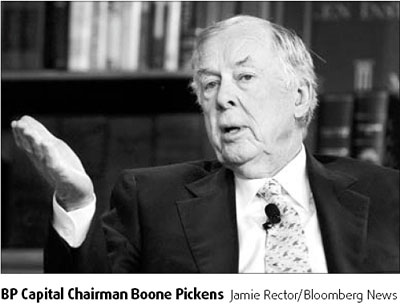Will Texas scrubland yield Pickens rich pickings?
Boone Pickens, the high-rolling oilman, may have engineered one of his shrewdest takeovers yet in the form of eight acres of Texas scrubland.
The land in Roberts County, a stretch of ranchland outside Amarillo, holds no oil. Instead, it is central to Pickens's plan to create an agency to condemn property and sell tax-exempt bonds in the search for one of his other favorite commodities: water.
Approval of the district is all but certain when Texans vote today in state and local elections. By law, only the two people who actually live on the eight acres will be allowed to vote - the manager of Pickens' nearby Mesa Vista ranch and his wife. The other three owners, who will sit on the district's board, all work for Pickens.
Pickens "has pulled a shenanigan", said Phillip Smith, a rancher who serves on a local water-conservation board. "He's obtained the right of eminent domain like he was a big city. It's supposed to be for the public good, not a private company."
Pickens and his allies say no shenanigans are involved. Once the district is created, the board will be able to issue tax-exempt bonds to finance construction of Pickens's planned 528-kilometer, $2.2 billion pipeline to transport water from the panhandle across the prairie to the suburbs of Dallas and San Antonio.
Buying the bonds

If Pickens can't find a buyer for the bonds or for his water - and he hasn't yet - he might buy the bonds himself to jump-start the project, said his Dallas-based lawyer, Monty Humble of Vinson & Elkins. The board will spend about $110 million to buy the right of way for the pipeline, using the power of eminent domain to acquire property if necessary, Humble said.
Pickens, 79, chairman of Dallas-based BP Capital LLC, says selling water is a business whose time, amid fears of global warming, may be at hand. His Mesa Water Inc has bought 200,000 acres of Texas water rights and talks of doubling his holdings.
Water has been a cheap and relatively plentiful resource in the United States, and massive infrastructure projects like the ones Pickens envisions looked like pipe dreams a few years ago.
Now, states such as Georgia are experiencing shortages, joining the ranks of Nevada, Arizona and other perennially water-poor states in the Southwest. Desalination plants are being built near California beaches, and water pipelines are snaking across the arid West.
Brink of crisis
Population growth, a prolonged drought some scientists link to climate change, and the expansion of water-intensive industries such as biofuels have put many regions on the brink of crisis.
"The market is being forced to find more creative solutions for water scarcity," said Goldman Sachs Group Inc analyst Deane Dray.
Pickens says he was motivated to take the plunge on water in 1997, when the Canadian River Municipal Water Authority, the local utility, declined to buy the water under his Roberts County ranch. The utility said there wasn't enough demand.
Almost double
With the population of Texas on track to almost double to 40 million by 2020, the water authority now wants more water, but Pickens has beat them to the punch by buying up big chunks of water rights.
The Texas panhandle may look arid on the surface, but underground it's a different story.
The panhandle rests on part of the 451,000-square-kilometer Ogallala Aquifer, North America's biggest underground water reservoir and among the most pure.
Mesa Water's website touts Ogallala's water as "high-quality, terrorist-resistant, and drought-proof".
Still, Pickens faces obstacles. To help pay for construction, he plans to piggyback wind power on the water infrastructure.
He plans wind farms on the ranch land and wants to run electricity cables along the right-of-way of Mesa's water pipeline.
All told, the wind and water project is projected to cost more than $10 billion.
The pipeline alone will run $2.2 billion. Pickens said he has about $100 million invested so far. "This is a $10 billion project," he said in an interview. "It better be profitable."
Most of all, he needs a group of confirmed buyers for his water. That's in part because of political resistance to his plan for gobbling up water rights. Several Dallas-area water districts have refused to sign up.
"We have real concerns about private control of water," said Ken Kramer, director of the Texas Sierra Club.
"Water is a resource, yet in some respects it is a commodity. It's essential to human life as air. That puts water in a different class."
Bloomberg News
(China Daily 11/07/2007 page16)














